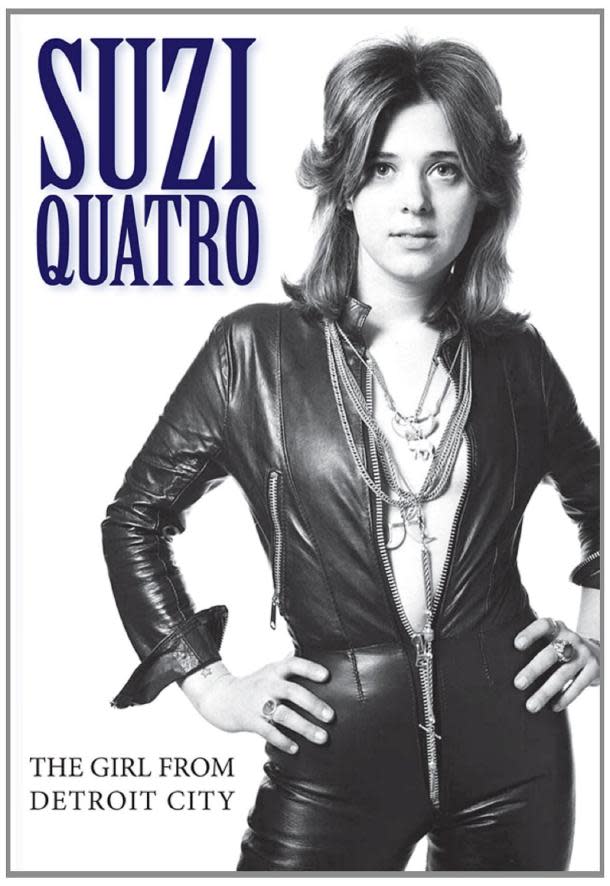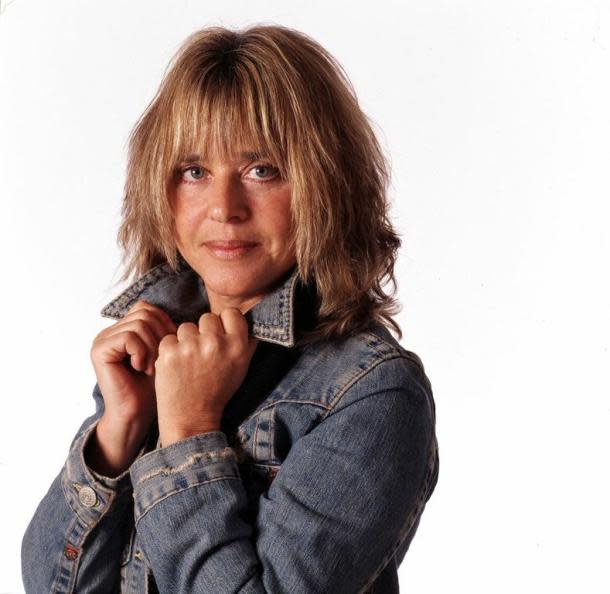Star Apps: Suzi Quatro
When rock icon Suzi Quatro picked up her first guitar in the '50s, she had no women role models, so she turned to Elvis. "I had an epiphany that I knew that I wanted to be just like him -- at that age," she said. "It's crazy that it happened that young. But I have always been aware of my path." Over the course of a 50-year career, Quatro has won legions of fans for singles such as "Can the Can," "If You Can't Give Me Love," "Stumblin' In" (with Chris Norman), and "She's in Love With You," as well as for playing Leather Tuscadero on "Happy Days." Quatro is marking her gold anniversary with a retrospective box set called "The Girl From Detroit City."

Suzi Quatro's career-spanning box set will be released on October 27.
(Credit: Cherry Red Records)
What can you tell us about the forthcoming box set?
I'm very proud of it. I took a lot of trouble to make sure it was entirely representative of my entire 50-year career. So it has my first song from when I was 14, all the way to the new one, "The Girl From Detroit City."
Like Iggy Pop, Madonna, and Ted Nugent, you're a butt-kicker from Michigan. What makes musicians from that particular state so tough?
My own personal opinion is that there's a desperate energy in Detroit. We put our foot on the gas and go as fast as we can. It's black, white, rich, poor, and desperate. There's a feeling in Detroit where it's a city of extremes, which is why you get a desperation energy there. You have a love-hate relationship with it.
You've lived in England since the early '70s. Do you ever miss Detroit?
Yes, I will always miss Detroit. I still feel like an American in England. You never lose your roots.
How did you end up with producer Mickie Most?
I had been waiting for someone to tap me on the shoulder. When my first group, The Pleasure Seekers, turned into Cradle, I took a back seat. We had brought in my little sister, and I was focusing on bass guitar. Elektra came to see the band, and the boss offered me a solo contract. It was the same week that Mickie Most offered me a solo deal. I decided to go with the English offer, because he saw me more clearly. I don't think he knew how to produce me. He knew what I wasn't and not what I was.
How difficult was it being one of the early women of rock 'n' roll? I know that later Heart, Joan Jett, and Pat Benatar got it pretty rough from audiences.
I never had the spitting, and the comments happened only once, and it was a drunk guy in a bar. But what set me apart from everyone else is that I don't do gender. I don't think I'm a woman. I think I'm me. When I made my first album, I recorded a cover of "I Wanna Be Your Man" and didn't change the words. What it means is I'm strong. It wasn't that I'm a female playing an instrument. It simply said, "Here I am." I took myself seriously as a musician from day one.
Are there enough women in rock today?
I think we're at a pretty good place. There are a lot of young, good women musicians. Where they have to be careful is if you're a female musician, you should stick to playing music. Keep your mystery as a female but still rock your heart out. I don't like the exposing. I think it takes away from what the object of the exercise is. You have certain people who are excellent. But is there another me anywhere? I don't think so.
You were originally influenced not by a woman but by Elvis.
He was on "The Ed Sullivan Show." It was 1956, and he was doing "Don't Be Cruel." I had an epiphany that I knew that I wanted to be just like him -- at that age. It's crazy that it happened that young. But I have always been aware of my path.
Watch this classic performance of "Can the Can":
How did you end up playing Leather Tuscadero on "Happy Days"?
I was in Japan on tour and got a call from my US publicist about this part they wanted me to play. They had the script for a long time, and they couldn't find the person who was soft and hard and could sing and act. The casting lady saw my album cover on her daughter's wall and wanted me to audition. I got the part, and it gave me another lease on life, in terms of a career in America.
You won a new generation over with a cameo appearance on "Absolutely Fabulous" in 1994. How did you end up on the show?
Jennifer Saunders really wanted me to be on it, and I said yeah because I liked her. She had a loose script, so I asked her if I could play with it, and she said, "Suzi, do what you want." So I wrote the script, and it worked. It doesn't matter what you throw at her; she's always game.
You recently announced your final Australian tour. Are you about to call it quits?
I want to do a series of these, even though I'm not ready to hang up my suit. 2015 will be my 51st year in the business, so if I ever unwind a little bit, I'd like to give them their first final gift of a final Australian tour, a two-hour show where I'm my own supporting act.
How about the US? You haven't toured here in decades.
I would love to tour America again. We'll see if the box set generates enough interest to warrant that. But if I could do it, I would die a happy woman.

Quatro says another US tour is not out of the question.
(Credit: Cherry Red Records)
I know you're very active on social media. What are your favorite apps?
Facebook, Twitter, Skype, and YouTube. I have a radio show, and YouTube really helps when I have to do research, since I can get the song and all the information.

